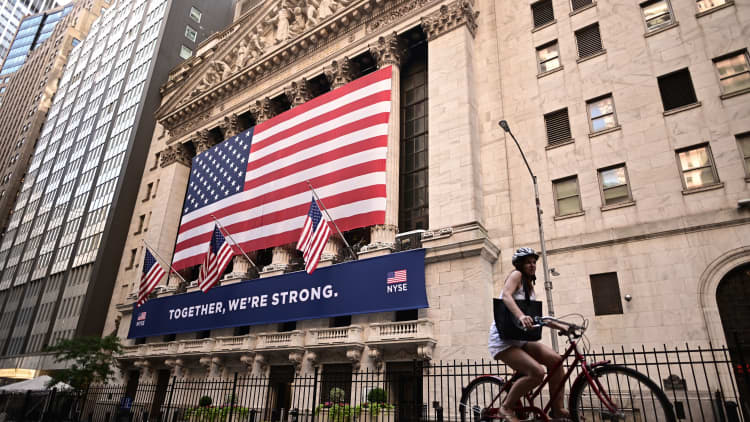
Stocks fell on Thursday as shares of the major tech companies struggled once again and traders digested a mixed batch of corporate earnings and economic data.
The Dow Jones Industrial Average dropped 135.39 points, or 0.5%, to 26,734.71 and snapped a four-day winning streak. The S&P 500 slid 0.3% to 3,215.57 and the Nasdaq Composite pulled back 0.7% to close at 10,473.83.
Shares of Microsoft and Apple fell more than 1% each. Amazon dipped 0.3%. Netflix — which was set to report earnings after the bell — erased earlier losses and gained 0.8%. The streaming giant's stock dropped more than 11% after hours on the back of its results.
Big Tech has been the best-performing group in the stock market this year as investors bet their business models could withstand the coronavirus economic slowdown. However, they have struggled this week. Netflix is down more than 3% week to date; Facebook, Amazon, Alphabet and Microsoft are also down over that time period.
"Over the next few weeks the core tech titans are set to report earnings," said Dan Ives, an analyst at Wedbush. "This will be a pivotal few weeks for investors to gauge how the tech stalwarts business models/trends are holding up in this unprecedented COVID-19 storm and will be a key barometer for overall consumer and enterprise spending trends during this semi-lockdown backdrop."
The corporate earnings season began this week and continued with Bank of America reporting better-than-expected earnings for the previous quarter. However, the stock fell more than 2% as the company set aside $4 billion for coronavirus-related losses.
Dow member Johnson & Johnson gained 0.7% on the back of better-than-expected earnings. Morgan Stanley popped 2.5% after the company's quarterly earnings easily beat analyst expectations on the back of strong trading revenues.
Jobless claims disappoint, retail sales surge again
The weekly jobless claims number came in slightly worse than expected. The Labor Department said a total of 1.3 million Americans filed for unemployment benefits last week, compared to Dow Jones estimates of 1.25 million first-time filers.
However, retail sales jumped 7.5% in June, topping expectations of a 5.2% increase per Dow Jones. This reading came after May's 17.7% surge, which blew past estimates and was the largest reading on record.
Paul Ashworth, chief U.S. economist at Capital Economics, said the U.S. retail sales data could signal a big economic rebound in the third quarter. "But with the new wave of infections leading to renewed closures and restriction in some states, we still think the balance of risks to that third-quarter forecast lie to the downside," he said.
More than 3.5 million coronavirus cases have been confirmed in the U.S. along with at least 137,846-related deaths, according to data from Johns Hopkins University.
Shares of companies that would benefit from the economy reopening struggled Thursday. Cruise operators Carnival, Royal Caribbean and Norwegian Cruise Line all fell more than 7%. United Airlines dropped more than 5% and American slipped 7.4%.
Thursday's moves followed a major sell-off in mainland Chinese stocks, which saw the Shanghai composite down more than 4% on the day. The decline in Chinese equities followed the release of disappointing retail sales data in China, which dampened the enthusiasm around second-quarter GDP growth of 3.2%.
The iShares China Large Cap ETF (FXI) closed more than 2% lower. The iShares MSCI Emerging Markets ETF (EEM) was also under pressure, sliding more than 1%.
Wall Street was also coming off strong gains from the previous session, as news regarding a potential coronavirus vaccine lifted investor sentiment. Although some investors think expectations should be tempered.
"We are not out of the woods yet and are still far away from returning to pre-Covid-19 economic levels," said Nate Fischer, chief investment strategist at Strategic Wealth Partners.
"The market is in need of a health-care solution, as the economy was forced to shut down for a health-care issue. So far, we've had fiscal and monetary assistance to this problem. Until a real medical remedy is found, the market will remain volatile," he added.
Subscribe to CNBC PRO for exclusive insights and analysis, and live business day programming from around the world.
—CNBC's Eustance Huang contributed to this report.



